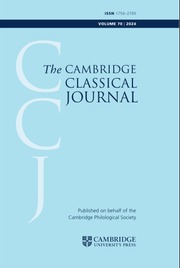Article contents
Horace and historians
Published online by Cambridge University Press: 23 January 2012
Extract
In ‘the only coherent piece of autobiography which we possess from Horace's pen’, as Fraenkel has called it, the poet wrote these famous lines (Epist. 2.2.49–52):
- unde simul primum me dimisere Philippi,
- decisis humilem pinnis inopemque paterni 50
- et laris et fundi paupertas impulit audax
- ut uersus facerem.
- As soon as Philippi discharged me thence, poverty drove me—grounded as I was, with my wings clipped, and deprived of my ancestral home and farm—boldly to produce verses.
As is remarked by Lyne, however, ‘Horace here omits an intervening and prosaic stage’. The evidence for this omission comes from Suetonius' biography of the poet, in which the same period of Horace's life is described slightly differently: ‘uictisque partibus uenia impetrata scriptum quaestorium comparauit. ac primo Maecenati … insinuatus…’ (‘after the defeat of his party and a successful request for pardon he procured the position of scriba quaestorius. And having first become involved with Maecenas…’). What was the exact sequence of events? Lyne, like Brink, proposes that Horace after Philippi derived income from his position as scriba quaestorius and that this in turn enabled him to write the poetry which eventually brought him to Maecenas' attention. Nisbet, on the other hand, thinks that Horace's early poetry elicited subsidies from ‘grandees like Pollio and Messalla’ and that these provided him with the wherewithal to buy his position as scriba, from which he was effectively relieved by his later association with Maecenas.
- Type
- Research Article
- Information
- Copyright
- Copyright © The Author(s). Published online by Cambridge University Press 2009
References
BIBLIOGRAPHY
- 1
- Cited by




